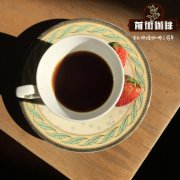Is there anything special about the flavor of Fairtrade coffee? What is the way of Fairtrade coffee?

Professional coffee knowledge exchange more coffee bean information please follow the coffee workshop (Wechat official account cafe_style)
Take coffee as an example. Coffee is the second largest commodity in global trade after oil, with tens of millions of people engaged in coffee cultivation, processing and trade. In Ethiopia, 1 / 5 of the population depends on coffee cultivation or processing for a living, accounting for 65% of the country's total export value, but many small farmers are getting poorer and poorer due to unfair trade.
Coffee trade is monopolized by multinational enterprises in several developed countries, and the price is also determined by the futures market affected by them. Small farmers have no bargaining power in the face of multinational enterprises. When prices are low, the agricultural production of small farmers often lose all their money.
In addition, many international trade commodities have to face numerous trade barriers, for example, rich countries provide subsidies or help dumping to farmers or enterprises in their own countries, making the products of small farmers in poor countries lose their competitiveness in the international market, coupled with the exploitation of middlemen, production costs are rising, and small farmers work hard in the process of planting, but it is not a change in their lives.
Small farmers struggle to survive in the unfair trade system
Poor small farmers exploited by unjust institutions are also fighting for change, as in the case of SOFA, a small organic farmers' association in Sri Lanka.
The small Organic Farmers Association SOFA operates on the principle of fair trade. The association has a fair trade community development fund to support local women to participate in self-employment programs and to make tea-picking baskets for self-reliance. SOFA also enables the children of small farmers to receive pre-school education, benefiting the whole community.
Some fair trade methods
Farmers set up and operate cooperatives to sell products to non-governmental organizations or companies at "fair" prices that can cover production costs and maintain a basic standard of living.
Farmers establish direct contact with foreign buyers, thus influencing commodity prices more forcefully.
Buyers pay a lump sum in advance and sign a longer-term purchase contract to protect the livelihood of small farmers, and farmers can better plan their production.
The use of environmentally friendly planting methods to ensure that the soil quality of the land is maintained.
Return part of the profits to the community and improve planting skills and production and processing techniques.
To set up a community development fund, farmers will decide for themselves how to promote the long-term sustainable development of the community, such as the construction of schools, safe water facilities, clinics, and so on.
Important Notice :
前街咖啡 FrontStreet Coffee has moved to new addredd:
FrontStreet Coffee Address: 315,Donghua East Road,GuangZhou
Tel:020 38364473
- Prev

What is Fair Trade? Is Starbucks Fair Trade Coffee Good?
Professional coffee knowledge exchange More coffee bean information Please pay attention to coffee workshop (Weixin Official Accounts cafe_style) Today, global trade is growing rapidly and global wealth has reached an unprecedented level. But at the same time, the disparity between the rich and the poor is also rapidly increasing. Eight super-rich people own half of the world's wealth, while the assets owned by the poorer half of the world's population are not rising but falling. global
- Next

Does drip filter coffee taste good? is drip filter coffee also known as American coffee? introduction to the brewing method of drip filter coffee
Professional coffee knowledge exchange more information about coffee beans Please follow the coffee workshop (Wechat official account cafe_style) the caffeine content of dripping coffee depends on the brewing method, size and concentration. A cup of 8-ounce (237 ml) drip-filtered coffee contains about 95-163 mg of caffeine, which is 2-5 times that of a regular soda.
Related
- Beginners will see the "Coffee pull flower" guide!
- What is the difference between ice blog purified milk and ordinary milk coffee?
- Why is the Philippines the largest producer of crops in Liberia?
- For coffee extraction, should the fine powder be retained?
- How does extracted espresso fill pressed powder? How much strength does it take to press the powder?
- How to make jasmine cold extract coffee? Is the jasmine + latte good?
- Will this little toy really make the coffee taste better? How does Lily Drip affect coffee extraction?
- Will the action of slapping the filter cup also affect coffee extraction?
- What's the difference between powder-to-water ratio and powder-to-liquid ratio?
- What is the Ethiopian local species? What does it have to do with Heirloom native species?

